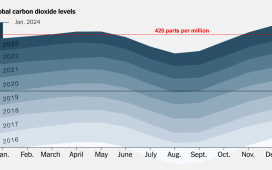A tropical storm named Bertha could bring heavy rain, whipping winds and potentially life-threatening flash floods to parts of the Carolinas and Virginia on Wednesday, the National Weather Service said.
After quickly gathering strength off the coast of South Carolina, Bertha was named a tropical storm less than two hours before it made landfall about 20 miles east of Charleston, S.C., at 9:30 a.m. on Wednesday. At the time, it was packing sustained winds of 50 miles an hour.
By Wednesday afternoon, it had weakened to a tropical depression but remained a potentially deadly threat, the Weather Service said.
Meteorologists warned that downpours from the storm could cause rivers to flood before it gradually weakens over the next 48 hours.
It was expected to crawl across South Carolina on Wednesday and into central North Carolina by Wednesday night before reaching southwestern Virginia early Thursday.
In parts of South Carolina on Wednesday, Bertha was producing winds of 35 miles an hour, and the Weather Service warned that some power outages were possible as trees in the rain-soaked ground toppled.
The storm could also flood rivers that are already engorged from earlier heavy rainfall, the Weather Service said. Total rainfall from the storm could reach two to four inches, although some spots could be deluged with as much as eight inches of rain.
Bertha was the second named storm to arrive before the start of the Atlantic hurricane season, which runs from June 1 through Nov. 30.
Earlier this month, Tropical Storm Arthur formed off the coast of Florida and approached North Carolina, making this the sixth year in a row in which a named storm has slipped in before the official start of the season.
The Weather Service has already forecast a more active Atlantic hurricane season this year. The outlook calls for 13 to 19 named storms, up from 12 on average, of which six to 10 could become hurricanes, compared with six in an average season.
The worrisome forecast could be further complicated by the coronavirus pandemic, which is hobbling relief agencies and could turn evacuation shelters into disease hot spots.

